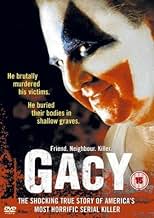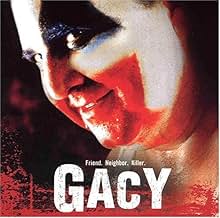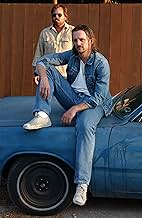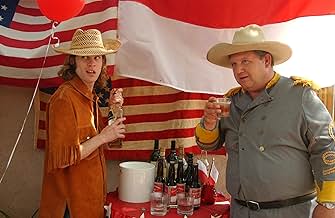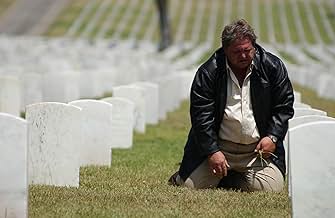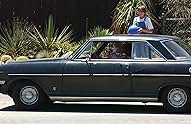IMDb-BEWERTUNG
4,7/10
5059
IHRE BEWERTUNG
Eine grausige wahre Geschichte über das teuflische Leben von John Wayne Gacy, einer ungeheuren Person, die Jungen aufspürte und ihre Körper im Keller seines Hauses aufhäufte.Eine grausige wahre Geschichte über das teuflische Leben von John Wayne Gacy, einer ungeheuren Person, die Jungen aufspürte und ihre Körper im Keller seines Hauses aufhäufte.Eine grausige wahre Geschichte über das teuflische Leben von John Wayne Gacy, einer ungeheuren Person, die Jungen aufspürte und ihre Körper im Keller seines Hauses aufhäufte.
Kenny Swartz
- Dave
- (as Kenneth Swartz)
Jer Adrianne Lelliott
- Little Stevie
- (as a different name)
Joseph Sikora
- Roger
- (as Joe Sikora)
Empfohlene Bewertungen
Based on true story, this film focuses on the life of serial killer John Wayne Gacy (Mark Holton). He was a model citizen, a successful businessman, a family man and occasional clown for children at a hospital, until something motivated him to sodomize and murder thirty young boys and dispose of them in the crawlspace underneath his house.
Despite Holton's decent performance as the infamous serial killer, dull writing, directing and pacing sinks this boring film. More detail on Gacy would've helped, but instead we get obligatory shots of maggots over dead bodies. Gross! If you really want to learn about serial killers like Gacy read about it on the Internet or check out a book at the library; you'll be much better off.
My evaluation: NO STARS
Despite Holton's decent performance as the infamous serial killer, dull writing, directing and pacing sinks this boring film. More detail on Gacy would've helped, but instead we get obligatory shots of maggots over dead bodies. Gross! If you really want to learn about serial killers like Gacy read about it on the Internet or check out a book at the library; you'll be much better off.
My evaluation: NO STARS
This film is part biopic, part psychological portrait of real-life serial killer John Wayne Gacy, Jr. (played here by Mark Holton). It begins with a brief scene of an 11-year old Gacy with his father, before jumping to Gacy's later life with his second wife, when he was living just outside of Chicago. It roughly covers a number of events up to Gacy's arrest, but not his trial or later years.
This is one heck of a difficult film to rate. Co-writer David Birke also co-wrote another serial killer biopic/psychological portrait, Dahmer (2002), and both films suffer from many of the same flaws. Gacy may have even more problems. There are countless things that could have been done better.
Yet in combination with co-writer and director Clive Saunders, Gacy manages to retain your interest, and excels at the prime directive of serial killer flicks--it makes the viewer feel profoundly uncomfortable. If judged solely on that aspect, the film would deserve a 10 out of 10. Of course, not everyone wants that kind of emotional experience with a film, but it seems to me that if a serial killer flick doesn't make you uncomfortable, something went wrong. The subject isn't exactly puppy dogs and pixie sticks, unless we're talking about barbecuing puppies and using the pixie sticks for spice.
Let's get out of the way that the film isn't precisely, historically accurate, and it's far more historically incomplete. I don't consider that a flaw. Saunders makes it more than clear a couple times that he's used facts about Gacy's life as inspiration. This is not a documentary, but a fictionalization--specifically it's "historical fiction". Gacy had a relatively complicated life, and understanding his crimes "realistically" involves looking at a huge time span of complex events. There's no way it could be done in 90 minutes, or even 180 minutes.
However, the events that Birke and Saunders choose to show too often seem random, and there's too much exposition missing. We get one scene of Gacy-as-a-boy with his dad, whom we see being mildly abusive. This isn't sufficient to establish anything significant about Gacy's youth. There either should have been more material like this, or it should have been dropped altogether and simply mentioned at some point, perhaps during a bit of self-reflective dialogue (which we get later anyway).
Next we jump to a screen full of text telling us that Gacy was convicted of sodomizing a boy and spent 18 months in prison. Then we jump again, and suddenly we see Gacy living with a woman about his age, two younger girls and an older woman. We can figure out that this is his wife (it was actually his second wife) and mother, and we assume it's his kids (they weren't, they were stepdaughters). Eventually we're told their relationships (except my parenthetical facts), but it doesn't help that it is initially presented as something of a mystery.
There's a general lack of exposition as exemplified above that makes the film play more surrealistically if you're not familiar with Gacy's story. Sometimes this works--the inserts of Gacy eating chicken and dressed up as an alternate world Colonel Sanders (Gacy's first wife's family owned a number of Kentucky Fried Chicken restaurants in Iowa) are particularly striking, even if the viewer can't quite figure out why they're present. But just as often the lack of exposition is more of a problem, as with the two hippie-looking guys who are staking out Gacy near the end of the film. It's never quite clear who they are, why they're around, or why in some cases they appear to have lawn chairs set up within about 30 feet of Gacy's front door.
There are a lot of interesting facts about Gacy that are hinted at but not shown very well. For example, he was actually well liked by a number of people and he was very involved with community groups such as the Jaycees at one point. His fascination with clowns was also much more bizarre than is shown in the film. He had unusual makeup that friends recommended he change because it had potential to scare children, and he was an amateur artist who painted weird but wonderful clown/skeleton canvases (well, I like it at least, but I have a taste for outsider art, including psychotic stuff). In conjunction with the clown fascination, Saunders employs subtle carnival music in the score at one point. This worked well, but would have been better if more regular and prominent.
What Saunders focuses on instead are those elements that provide that uncomfortableness I was talking about earlier. Gacy had a crawl space beneath his house that served as a dumping ground for bodies and that produced an infamous stench. Saunders dwells on the crawl space, appropriately. He also fills it with cockroaches, maggots and other insects. Gacy comes across as consistently pathetic, almost sad, as does most of the rest of the cast, surprisingly enough, including Gacy's family and most of his victims. It's difficult when watching the film to believe that some of the victims would make themselves as available as they did, especially over time, but this is based on truth. A lot of small, subtle "beats" add to the pathetic feeling, including the driving shots through the dirty windshield, and a lot of white trash characters who look unkempt, who drive wrecks, and who work in dilapidated environments. Even though I ended up wishing there was more of the carnival music, I also loved the melancholy score that is prominent about two-thirds of the way through the film.
While the film might not provide a lot of psychological insight into Gacy, if such would be possible--he truly comes across as very rational and completely insane at the same time, and it might have benefited from a more linear, in-depth look at some of the victims, the film still succeeds by delivering a deeply disturbing atmosphere.
This is one heck of a difficult film to rate. Co-writer David Birke also co-wrote another serial killer biopic/psychological portrait, Dahmer (2002), and both films suffer from many of the same flaws. Gacy may have even more problems. There are countless things that could have been done better.
Yet in combination with co-writer and director Clive Saunders, Gacy manages to retain your interest, and excels at the prime directive of serial killer flicks--it makes the viewer feel profoundly uncomfortable. If judged solely on that aspect, the film would deserve a 10 out of 10. Of course, not everyone wants that kind of emotional experience with a film, but it seems to me that if a serial killer flick doesn't make you uncomfortable, something went wrong. The subject isn't exactly puppy dogs and pixie sticks, unless we're talking about barbecuing puppies and using the pixie sticks for spice.
Let's get out of the way that the film isn't precisely, historically accurate, and it's far more historically incomplete. I don't consider that a flaw. Saunders makes it more than clear a couple times that he's used facts about Gacy's life as inspiration. This is not a documentary, but a fictionalization--specifically it's "historical fiction". Gacy had a relatively complicated life, and understanding his crimes "realistically" involves looking at a huge time span of complex events. There's no way it could be done in 90 minutes, or even 180 minutes.
However, the events that Birke and Saunders choose to show too often seem random, and there's too much exposition missing. We get one scene of Gacy-as-a-boy with his dad, whom we see being mildly abusive. This isn't sufficient to establish anything significant about Gacy's youth. There either should have been more material like this, or it should have been dropped altogether and simply mentioned at some point, perhaps during a bit of self-reflective dialogue (which we get later anyway).
Next we jump to a screen full of text telling us that Gacy was convicted of sodomizing a boy and spent 18 months in prison. Then we jump again, and suddenly we see Gacy living with a woman about his age, two younger girls and an older woman. We can figure out that this is his wife (it was actually his second wife) and mother, and we assume it's his kids (they weren't, they were stepdaughters). Eventually we're told their relationships (except my parenthetical facts), but it doesn't help that it is initially presented as something of a mystery.
There's a general lack of exposition as exemplified above that makes the film play more surrealistically if you're not familiar with Gacy's story. Sometimes this works--the inserts of Gacy eating chicken and dressed up as an alternate world Colonel Sanders (Gacy's first wife's family owned a number of Kentucky Fried Chicken restaurants in Iowa) are particularly striking, even if the viewer can't quite figure out why they're present. But just as often the lack of exposition is more of a problem, as with the two hippie-looking guys who are staking out Gacy near the end of the film. It's never quite clear who they are, why they're around, or why in some cases they appear to have lawn chairs set up within about 30 feet of Gacy's front door.
There are a lot of interesting facts about Gacy that are hinted at but not shown very well. For example, he was actually well liked by a number of people and he was very involved with community groups such as the Jaycees at one point. His fascination with clowns was also much more bizarre than is shown in the film. He had unusual makeup that friends recommended he change because it had potential to scare children, and he was an amateur artist who painted weird but wonderful clown/skeleton canvases (well, I like it at least, but I have a taste for outsider art, including psychotic stuff). In conjunction with the clown fascination, Saunders employs subtle carnival music in the score at one point. This worked well, but would have been better if more regular and prominent.
What Saunders focuses on instead are those elements that provide that uncomfortableness I was talking about earlier. Gacy had a crawl space beneath his house that served as a dumping ground for bodies and that produced an infamous stench. Saunders dwells on the crawl space, appropriately. He also fills it with cockroaches, maggots and other insects. Gacy comes across as consistently pathetic, almost sad, as does most of the rest of the cast, surprisingly enough, including Gacy's family and most of his victims. It's difficult when watching the film to believe that some of the victims would make themselves as available as they did, especially over time, but this is based on truth. A lot of small, subtle "beats" add to the pathetic feeling, including the driving shots through the dirty windshield, and a lot of white trash characters who look unkempt, who drive wrecks, and who work in dilapidated environments. Even though I ended up wishing there was more of the carnival music, I also loved the melancholy score that is prominent about two-thirds of the way through the film.
While the film might not provide a lot of psychological insight into Gacy, if such would be possible--he truly comes across as very rational and completely insane at the same time, and it might have benefited from a more linear, in-depth look at some of the victims, the film still succeeds by delivering a deeply disturbing atmosphere.
The filmmakers do state up front in their opening text that "Gacy" is a fictionalization of certain events in the serial killer's life, and not really intended as a full blown biography, but one can't help but feel that more detail would have been appreciated. We only get a brief prologue showing us Gacy's relationship with his tough guy father (Adam Baldwin) and how that affected him before fast forwarding dramatically to a point in his life where he was living with a wife and two (step) daughters after having served some time in prison for sodomizing a boy. That event is only referenced in text, and we don't learn anything about his prison time, or much about his life aside from his misdeeds. With a little more "meat" to it, this movie could have been quite good; as it is, it still achieves the goal of being genuinely creepy and disgusting, perfectly fitting for any story about a serial killer. After what could be perceived as something of a slow start, co-writer / director Clive Saunders shows us basically the lurid details of Gacy's life, and just touching lightly upon the public image he had of being an upstanding citizen. It would be hard not to be affected by the sight of so many cockroaches and maggots as the crawlspace underneath Gacy's suburban Chicago house has seen over two dozen victims buried there. (This leads to some amusing very dark humour as Gacy is forced to deal with the problem, including the use of lime and the hiring of an exterminator (played by comedy veteran Larry Hankin, in a great cameo).) It would also be impossible not to be deeply disturbed seeing Gacy in action as he either coddles, spies on, or molests, his victims. Actor Mark Holton does a fine job, despite not having a lot to work with. Other performers in this movie such as Tom Waldman, Charlie Weber, Allison Lange, Edith Jefferson, Joleen Lutz, Rick Dean, Glenn Morshower, Dan Bell, and John Laughlin all contribute solidly, but it's Holton's sufficiently scummy portrayal, along with the pervasive seedy atmosphere that Saunders and company create, that keeps this movie moving along efficiently to its conclusion. Six out of 10.
I hadn't heard much about the Gacy Killings before I saw this movie. I guess you could say I'm uncultured considering he is one of the most well known serial killers of America. Anyway, I decided to give this movie a go, because I'm starting to open up to movies that aren't all about comedy and this seemed like a good contrast to try.
I was quite disappointed by the lack of depth. It seemed to just fill time with the same thing over and over again. He goes out, picks up a boy, brings him home and well...we know the rest. I suppose the main problem was the fact that we never really got an insight into him and how he thought and his real reasons for doing what he did. We had a little taste of his childhood and his abusive father right at the beginning of the film and heard a few flashback sounds throughout the film as constant reminders but that was it.
We also never really saw how this affected everybody else around him. His co-workers, friends, neighbours, wife, mother, children. I mean they were all a part of his life and even lived in the same house. It would have been nice to include this in the storyline. I feel this film was more of a documentary to tell people who he was and what he did rather than open up a bit of light as to what went on behind it all.
I've seen other serial killer movies and they all seem to at least explain a little as to what is going on. We never really got a look at it through his eyes, which is what I guess everybody will be expecting to see.
Overall, it was a pretty boring account of what happened and although my thoughts go out to those that were lost and the people that were affected by these real life events. I feel this film has done nothing but bring back painful memories for those involved. A film best left alone...
If you're thinking of watching this movie. I suggest you do it on a night where you've got nothing better to do because it really isn't that entertaining.
I was quite disappointed by the lack of depth. It seemed to just fill time with the same thing over and over again. He goes out, picks up a boy, brings him home and well...we know the rest. I suppose the main problem was the fact that we never really got an insight into him and how he thought and his real reasons for doing what he did. We had a little taste of his childhood and his abusive father right at the beginning of the film and heard a few flashback sounds throughout the film as constant reminders but that was it.
We also never really saw how this affected everybody else around him. His co-workers, friends, neighbours, wife, mother, children. I mean they were all a part of his life and even lived in the same house. It would have been nice to include this in the storyline. I feel this film was more of a documentary to tell people who he was and what he did rather than open up a bit of light as to what went on behind it all.
I've seen other serial killer movies and they all seem to at least explain a little as to what is going on. We never really got a look at it through his eyes, which is what I guess everybody will be expecting to see.
Overall, it was a pretty boring account of what happened and although my thoughts go out to those that were lost and the people that were affected by these real life events. I feel this film has done nothing but bring back painful memories for those involved. A film best left alone...
If you're thinking of watching this movie. I suggest you do it on a night where you've got nothing better to do because it really isn't that entertaining.
I'd like to know what the purpose was behind the making of this film. The Gacy story would have been served better by a more documentary approach, instead of this weak "grand guignol" version which spends more time focusing on maggots and bad smells than on Gacy and his background. Are we to believe that he's a psychopath because his dad whacked him around on a fishing trip (and maybe elsewhere)? His married life is brushed over casually (what happened in all the OTHER years of his marriage?), and his business and social life was also given short shrift. Why did he kill the first boy? When did he lose control over his anger and perversion? He's just a hair-trigger, vulgar and angry guy through the entire film.
BUT HERE'S WHAT BUGS (sic) ME MOST ABOUT THIS FILM...when will L.A. producers realize that other parts of the country look different from California? This story took place in Des Plaines, IL, my wife's home town. (In fact, Gacy's last "pickup" was at a store just a few blocks from her house.) In the movie, Gacy's house and neighborhood look nothing like Chicago. The trees are wrong, the sky is wrong, the other buildings are wrong. They didn't even get the colors quite right on the Chicago police cars. Worst of all...as in many other Hollywood productions about Chicago...you can actually see MOUNTAINS in the background (during Gacy's party scene). Hollywood morons need to get out a little more! There is life beyond L.A. (At least they confessed to it in the closing credits.)
BUT HERE'S WHAT BUGS (sic) ME MOST ABOUT THIS FILM...when will L.A. producers realize that other parts of the country look different from California? This story took place in Des Plaines, IL, my wife's home town. (In fact, Gacy's last "pickup" was at a store just a few blocks from her house.) In the movie, Gacy's house and neighborhood look nothing like Chicago. The trees are wrong, the sky is wrong, the other buildings are wrong. They didn't even get the colors quite right on the Chicago police cars. Worst of all...as in many other Hollywood productions about Chicago...you can actually see MOUNTAINS in the background (during Gacy's party scene). Hollywood morons need to get out a little more! There is life beyond L.A. (At least they confessed to it in the closing credits.)
Wusstest du schon
- WissenswertesThe character of Tom Kovacs is a composite of two actual youngsters that lived with John Wayne Gacy during his murder spree.
- PatzerThe first bodies were discovered on Gacy's property in the heart of winter, December 1978. In the film, it is always summer-like weather.
- Zitate
Kara Gacy: God only knows what you're doing in there!
John Wayne Gacy, Jr.: What I am doing in that garage is all business related!
- VerbindungenFeatured in Cinemania: Oi pio diavoitoi dolofonoi: Alithines istories! (2009)
- SoundtracksI'm Moving On
Performed by Mark Fontana
Written by Mark Fontana and Michael Kramer
Courtesy of Black Saddle Music and Krammy Songs
Top-Auswahl
Melde dich zum Bewerten an und greife auf die Watchlist für personalisierte Empfehlungen zu.
Details
Box Office
- Budget
- 250.000 $ (geschätzt)
- Laufzeit
- 1 Std. 28 Min.(88 min)
- Farbe
- Sound-Mix
- Seitenverhältnis
- 1.78 : 1
Zu dieser Seite beitragen
Bearbeitung vorschlagen oder fehlenden Inhalt hinzufügen




